We asked our followers to pick a nickname for the first Type 26 Frigate, HMS Glasgow.
Sir William Connolly, (Billy to most) the Glaswegian comedian and favourite son of the city lead the inspiration with our most popular poll option being ‘The Big Yin’.
His first trade, in the early 1960s, was as a welder in the Glasgow shipyards, but he gave it up towards the end of the decade to pursue a career as a folk singer, firstly in the Humblebums alongside friend Gerry Rafferty until 1971, and subsequently as a solo artist.
In the early 1970s, Connolly made the transition from folk- singer with a comedic persona to fully fledged comedian, for which he has received numerous awards.
HMS Glasgow was named today, below are our favourites for the unofficial nickname. Which do you prefer?
— UK Defence Journal (@UKDefJournal) July 20, 2017
Defence Secretary Sir Michael Fallon said at a ceremony on the Clyde:
“The Clyde has been synonymous with shipbuilding for centuries.”
Defence Secretary added later:
“The Type 26 Frigate is a cutting-edge warship, combining the expertise of the British shipbuilding industry with the excellence of the Royal Navy. We will cut steel on the first ship later this month – a hugely significant milestone that delivers on our commitment to maintain our global naval power. These ships will be a force to be reckoned with, there to protect our powerful new carriers and helping keep British interests safe across the world.
“Backed by a rising defence budget and a £178bn Equipment Plan, the Type 26 programme will bring vast economic benefits to Scotland and the wider UK. The contract is structured to ensure value for taxpayers’ money and, importantly, now designed to protect them from extra bills from project overrun. The investment will secure hundreds of skilled jobs at BAE Systems on the Clyde for the next twenty years, and thousands of jobs in the supply chain across Britain.”
Commenting on this important announcement, Charles Woodburn, Chief Executive, BAE Systems said:
“The award of this contract is a strong endorsement of the talent and commitment of our employees across the UK and reinforces Glasgow as the centre of shipbuilding in the UK. We are extremely proud to be chosen to design and manufacture vessels that will give the Royal Navy an essential, next generation capability and be a vital addition to its fleet.
We will continue to invest in our technologies, productivity and people to help us deliver these ships to the highest standards. Today we have five River Class Offshore Patrol vessels at varying stages of construction for the Royal Navy across our shipyards in Glasgow and we look forward to starting manufacture on the first Type 26 ship in the coming weeks.”
A recent report also claims that delays in the construction of the Type 26 Frigate have had a negative impact on the development of the workforce on the Clyde.
The recently released report ‘Restoring the Fleet: Naval Procurement and the National Shipbuilding Strategy’, states that:
“It is clear to us that the delays in the construction of the Type 26 have had a negative impact on the development of the workforce on the Clyde.
Apprenticeships are not being offered at the necessary rate, and those currently undertaking apprenticeships are having their skills training disrupted. Furthermore, workers are being required to move from Scotland to Barrow in order for them to undertake meaningful work.
We welcome the efforts made by the trades unions and BAE to retain the workforce during this period of uncertainty, but remain deeply concerned by warnings that further delay could be “catastrophic” for the skills base.”
The UK Government say they are committed to eight advanced anti-submarine warfare ships, this was outlined in the 2015 Strategic Defence and Security Review. The Type 26 programme currently employs more than 1,200 people in the UK supply chain, with a number of contracts already in place for the manufacture of major equipment for the first three ships. In total, there are already 33 UK and international companies working in the supply chain to deliver the Type 26 ships – with further announcements to be made shortly.


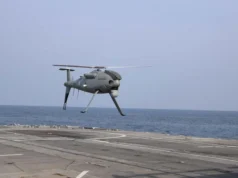
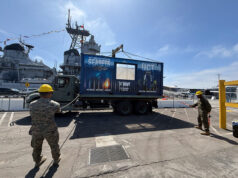
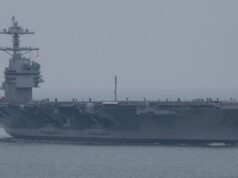
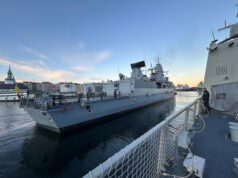
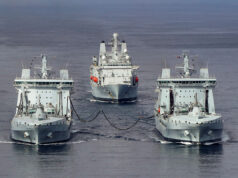


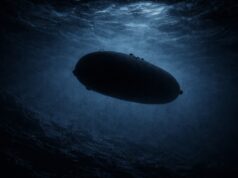
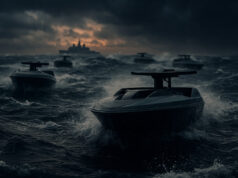
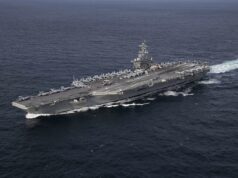

I suppose the official drink onboard will be Irn Bru.
Delighted with the chosen name – pretty apt considering The Big Yin worked on the Clyde. It would have been a terrible mistake to call it ‘The Glasgow Kiss’ – a detestable term, and an embarrassment to the city.
Been fed up for years with this image of Glasgow populated almost entirely by hard men, alcoholics & bigots. It’s so far removed from that past now.
Anyway, job done – she’s a fantastic ship.
Her nickname should be HMS BE for Bloody Expensive…nice one BAE you were supposed to deliver a capable frontline frigate for circa £600 million…like FREMM class instead we get a £1.23 billion ship. Reduction of numbers to 8 if we are lucky and a new light frigate that is not even designed yet that is supposed to fill out the fleers escort numbers.
I doubt on this performance Canada and Australia will go anywhere near the type 26 design for their future frigate programmes. Canada and Australia both need 12-15 ships of this class each.
Yep and buying cheap steel using all the excuses under the sun, does not ever make a ship cheaper, and is never value for money to source from abroad.
Be nice if an up to date CGI headed this post.